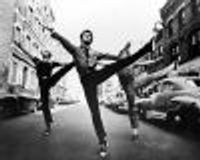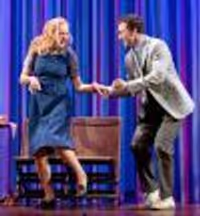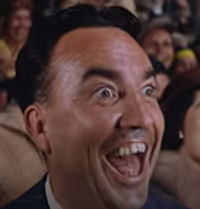Titanic - Fathom Events
#1Titanic - Fathom Events
Posted: 11/8/23 at 10:05pm
I didn't see a thread on this - apologies if I missed it.
Just got home from the "filmed live" version of Titanic and THOROUGHLY enjoyed it. I was actually surprised to see how many changes they made to the show from the original!! It made me very excited for Encores next year.
For those curious, the changes:
- Ismay now sings the opener "In Every Age".
- I found this to be less effective - especially as he is featured in the finale reprise of it... it feels better to have Andrews sing it.
- Many many doublings and triplings (unsurprising) due to the quite small cast (for the show, anyway)
- "Lady's Maid" - Jim Farrell now has a nice moment with the "I want to be a constable" line. Gives him much more depth. Kate also takes the last note up the octave "baby that I hold"
- 2nd Class passengers - Charles and Caroline - have their act 1 duet (cut in previews on Broadway) reinstated. Kind of slows the first act in my opinion...
- Lots of cuts in the No Moon/Autumn sequence. Cardoza is all but cut from the show - only appearing/being referenced in the "1st Class Roster". I really missed her card playing scene here. The majority of her lines (that weren't cut) are now given to Alice.
- Speaking of Autumn -- it felt as though Alice and Hartley may have had a romance???
- "Dressed in Your Pyjamas" - merely a staging change, but a bar cart no longer rolls across the floor to indicate the sinking. Now there is a VERY loud and eerie metal ripping sound effect, as well as the lights cut out, and the safety lights come on. MUCH more effective in my opinion.
- "To Be a Captain Reprise" -- Murdoch kills himself???? Couldve been more effective but I really liked this idea.
- "Still" - staging change, they no longer wrap a glass and break it before the final "still"
- Various overlapping melodies added in the finale as well as the "To the Lifeboats" sequence.
Overall had a LOT of fun, cried a lot, and enjoyed it immensely. Anyone else catch it?
#2Titanic - Fathom Events
Posted: 11/8/23 at 11:18pm
Saw this tonight and enjoyed it overall. The score's soaring melodies and voices never fail to move me. I was aware that it was a small production with a small cast, but being on the big screen made it look smaller. That didn't bother me, though. My only major criticisms: I thought the weakest links in the cast were Edgar and Alice. I thought they had zero chemistry, and she lacked comedic timing. Doublings and triplings would not have bothered me in a live production but seeing the closeups on the big screen did.
#3Titanic - Fathom Events
Posted: 11/8/23 at 11:57pm
There was a thread - but not too active and buried near bottom of page 2. i posted:
"Went to the November 4 screening. Barnaby Hughes was the standout for me in an excellent cast. Was not a fan of the camera moving constantly - I was getting seasick. This show, in my opinion, did not need such active camera work and lthere was too much editing from medium to full to closeup. The sound mix seemed off at first so the vocals, I thought, did not seem to soar as much as I remember. Still, I swear it was my allergies acting up making my eyes watery and teary."
and a second post:
"Our screening was not well attended. There was my group of four. There was another couple and then a father and young daughter (maybe 10 years old). The father said he had hoped for more stage lighting effects. I told him that the lighting effects live were excellent when we saw this production in London. This is a film, so, of course, some of the immediacy and connection you get in the theatre are missing in part. But, the filmed version still has impact - at least for me.
Also, although this was filmed ( in part) in front of live audiences, the audience is rather muted - some applause after some numbers, and an occasional pull back to we see that there is an audience - but most of the time, I was not aware that there was an audience."
We got the DVD of the Australian production - but haven't watched it yet. There used to be many clips - maybe the whole show - on YouTube.
#4Titanic - Fathom Events
Posted: 11/9/23 at 3:34am
I saw this tonight too and I agree with most of the above. Ismay singing “In Every Age” didn’t work for me either and the structure suffered because of it. The original show structure is essentially bookended with Andrews opening the show with “In Every Age” and closing the show with his eleven o’clock number “Mr. Andrews’ Vision.” When we got to “Mr. Andrews’ Vision” in this production it almost didn’t make sense why Andrews was getting this big climactic song. He barely sang anything before that.
I didn’t care for “I Give You My Hand.” I agree it slowed down the first act. There’s a reason it was originally cut. It’s not needed. I also missed the Cardoza smoke room scene and wish they would have kept her along with the Jay Yates gambler character and storyline and the character of the Major who provided some comic relief in the original. They were all gone.
The Entr’acte wasn’t included and they cut the opening scene in act two between Astor and Widener about the silence from the engines being stopped. “Wake Up, Wake Up” was cut down so much it was completely missing one of the most haunting melodies Yeston wrote for the show “Almost midnight, strange commotion in the corridor” etc. That cut probably hurt the most. I love that melody.
I was also very disappointed to see the Murdoch suicide myth perpetuated. His body was never recovered. There’s no evidence that he killed himself. As far as I know that is a James Cameron invention. It’s not true. The rest of the show was written to honor and tell the stories of the real passengers and crew aboard the ship. It’s disingenuous to add that lie for no reason at all except dramatic effect. There was also an odd bit after the sinking where various characters were placing items on top of an overturned table. Whatever significance that moment was supposed to hold didn’t land for me at all. I didn’t understand it.
I have a bad habit of focusing on the things I didn’t like in these write ups. I should say I enjoyed it overall in spite of the minor cuts and changes. The book and score still shine and it remains one of my favorites. I thought Barrett and Bride were stand outs and the song between the two of them in the radio room remains my favorite song in the piece. The actors playing Ida and Isidor were also charming and “Still” remains the emotional heartbeat of the second act. The staging was very simple compared to the original but I thought it was mostly effective and the special effect for the final plunge was unexpected, simple but effective. I do hope the show is eventually made available on blu-ray or streaming. It would get repeat viewings from me.
#5Titanic - Fathom Events
Posted: 11/9/23 at 7:37am
I thought this was WONDERFUL. I saw the original, and I’m a devoted fan of the cast recording, but my memories of the show weren’t as sharp as many here, so I wasn’t as aware of the changes (though I WAS confused afterwards about who Becky Ann Baker had played—makes sense now hearing that Cardoza’s role was much reduced).
More than anything, I felt this made a case for the show being quite extraordinary and absolutely worth revisiting. That it held up so well on a unit set and with so much doubling from the cast was wonderful to see. Bravo to the director in particular. Fabulously done. Now I’m more excited AND more nervous for the Encores production!
#6Titanic - Fathom Events
Posted: 11/9/23 at 9:43am
As regards the reinstatement of "I Give You My Hand": in his introduction to the published libretto, Peter Stone makes some remark to the effect that everyone simply decided the Beanes were amply representative of Titanic's second class and thus no Charles / Caroline duet was strictly required.
Thom Southerland's production, meanwhile, seems to flip that on its head, as if to say "We've had how many movies / plays / what-have-you dedicated to drooling over Titanic's first class?" Did this necessitate turning first class into a glittery blob, paring their parts to the bone? Who knows, but I didn't miss the millionaires when they didn't pipe up. The substitutions made to amplify the theme of class were ample. (I especially loved the notion of Barrett on the dinner table.)
#7Titanic - Fathom Events
Posted: 11/9/23 at 11:02am
i COMPLETELY forgot about that absolutly haunting melody in "Wake Up Wake Up"... now that you mention it, I missed it too.
Had no idea the Murdoch Suicide myth... yes it now cheapens that effect quite a bit.
chrishuyen
Broadway Legend Joined: 11/12/14
#8Titanic - Fathom Events
Posted: 11/9/23 at 1:30pm
I knew pretty much nothing about the musical before seeing this screening yesterday, and I really enjoyed it! I missed the first couple of minutes so I don't think I saw Ismay singing In Every Age, but I agree with the other thread that it really seemed like they made him the villain of the piece, if there is one.
I agree that The Proposal/The Night Was Alive was a great highlight, and it was all the more heartbreaking when Bride couldn't get The Californian to respond to the distress call. I also really liked Barnaby Hughes as Etches, who I thought displayed great nuance in the character over the course of the show. Lucie-Mae Summer as Kate McGowan was also delightful to watch. Though overall the entire cast was quite wonderful, except for Martin Allanson as Ismay who I think was still a good actor but maybe the direction was what had him be essentially one second away from literally twirling his moustache at any moment.
Not sure if it's usually like this, but the transition to direct address to the audience felt a little clunky, but I like how it ended with the In Memoriam wall, which really drove home how many lives were lost.
#9Titanic - Fathom Events
Posted: 11/9/23 at 1:48pm
Unfortunately, the "addressing the audience" bit at the end is always how it's done... and i hate it EVERY time. It's so jarring. I can't believe they couldn't find a better way to end the show than with a history lesson being told to us... ah well.
#10Titanic - Fathom Events
Posted: 11/9/23 at 2:40pm
I have to imagine this ending is still better than the original ending with Michael Cerveris playing Robert Ballard and detailing the discovery of the wreck. If you read the book about the making of the show, because there was no out of town tryout, some of the book scenes and reprises of songs were written during previews on Broadway out of necessity to play down front in order to cover for scene changes that were taking longer than usual.
Once they scrapped the Robert Ballard ending I believe it’s stated in the book that they even previewed the show without a proper ending until the final scene was written. The address to the audience and the reprise of “In Every Age” was written because the crew needed a full six minutes to change the scenery from the tilting two tiered sinking boat deck/smoke room back to the Southampton ocean dock from the top of the show. All of that was literally written last minute just to cover a scene change.
If I remember correctly, the scene after “We’ll Meet Tomorrow” with the various conversations between the male passengers and crew left on board and the reprise of “To Be a Captain” were also written because the millionaire’s song “Behind Every Great Fortune” was cut and they needed another scene to play down front to cover the scene change from the two tiered boat deck/radio room to the boat deck/smoke room.
This production at least had the opportunity to stage the final address to the audience as though the survivors were giving their testimony at either the US Senate or British Board of Trade inquiries into the disaster, which is what I assumed the director was going for at the top of the show with the reassigning of “In Every Age” to Ismay, but ultimately he didn’t do that.
#11Titanic - Fathom Events
Posted: 11/9/23 at 5:25pm
In the Charing Cross version of this production, the opening was staged as if it were Ismay going to the hearings amid of crowd of accusing persons. Andrews was not a desk - the stage was empty other than the two tier scaffold set. "In every age" then starts as an explanation - almost an apology for reaching for the dream - before it becomes the "memory musical".
Theatrefan2
Stand-by Joined: 3/27/22
#12Titanic - Fathom Events
Posted: 11/10/23 at 5:06pm
CATSNYrevival said: "I saw this tonight too and I agree with most of the above. Ismay singing “In Every Age” didn’t work for me either and the structure suffered because of it. The original show structure is essentially bookended with Andrews opening the show with “In Every Age” and closing the show with his eleven o’clock number “Mr. Andrews’ Vision.” When we got to “Mr. Andrews’ Vision” in this production it almost didn’t make sense why Andrews was getting this big climactic song. He barely sang anything before that.
I didn’t care for “I Give You My Hand.” I agree it slowed down the first act. There’s a reason it was originally cut. It’s not needed. I also missed the Cardoza smoke room scene and wish they would have kept her along with the Jay Yates gambler character and storyline and the character of the Major who provided some comic relief in the original. They were all gone.
The Entr’acte wasn’t included and they cut the opening scene in act two between Astor and Widener about the silence from the engines being stopped. “Wake Up, Wake Up” was cut down so much it was completely missing one of the most haunting melodies Yeston wrote for the show “Almost midnight, strange commotion in the corridor” etc. That cut probably hurt the most. I love that melody.
I was also very disappointed to see the Murdoch suicide myth perpetuated. His body was never recovered. There’s no evidence that he killed himself. As far as I know that is a James Cameron invention. It’s not true. The rest of the show was written to honor and tell the stories of the real passengers and crew aboard the ship. It’s disingenuous to add that lie for no reason at all except dramatic effect. There was also an odd bit after the sinking where various characters were placing items on top of an overturned table. Whatever significance that moment was supposed to hold didn’t land for me at all. I didn’t understand it.
I have a bad habit of focusing on the things I didn’t like in these write ups. I should say I enjoyed it overall in spite of the minor cuts and changes. The book and score still shine and it remains one of my favorites. I thought Barrett and Bride were stand outs and the song between the two of them in the radio room remains my favorite song in the piece. The actors playing Ida and Isidor were also charming and “Still” remains the emotional heartbeat of the second act. The staging was very simple compared to the original but I thought it was mostly effective and the special effect for the final plunge was unexpected, simple but effective. I do hope the show is eventually made available on blu-ray or streaming. It would get repeat viewings from me."
The suicide was not a James Cameron invention. There are witness statements on record saying an officer was seen shooting himself. While these may not be concrete proof or accurate, it's not just been made up out of thin air. Like many things on that tragic night it is impossible to prove one way or another.
Who it was has been (and always will be) debated. Some historians have however concluded Murdoch as being the most likely candidate.
Videos





